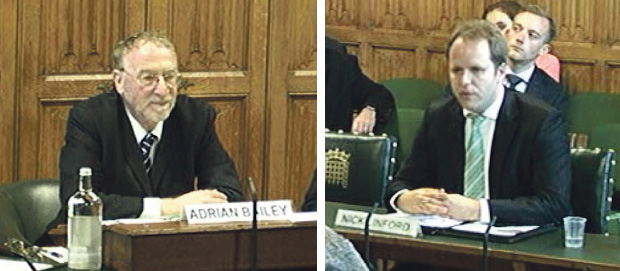Martin Doel, Chief Executive of the AoC and Tom Wilson, Director of Unionlearn and TUC giving evidence to the committee
Apprenticeship funding rates and employer contributions were two of the biggest issues raised by Martin Doel, chief executive of the Association of Colleges (AoC), at an evidence session held by the Business, Innovation and Skills (BIS) Select Committee for their inquiry into apprenticeships last week.
Mr Doel, speaking at the Houses of Parliament alongside Tom Wilson, director of unionlearn, said he was particularly concerned with the reduced funding rates for apprentices aged between 18 and 24, as well as the number of businesses offering none of their own investment.
“With the presumed 50 per cent contribution from employers – which is not a cash contribution but can be handed in kind – and the tendency for providers to be led into a process of undercutting each other below that presumed 50 per cent contribution from the employer…that must be, I think, an incipient threat of quality,” Mr Doel said.
The AoC chief executive said the further education sector, including the National Apprenticeship Service (NAS), needed to
“get to grips” with the issue quickly.
However, he later added it wasn’t as simple as introducing mandatory match funding, equivalent to a 50 per cent contribution from the employer.
“We need to pause and think about the most effective way to see that funding rates are effective,” Mr Doel told the Committee.
He also suggested looking again at the “Independent review of fees and co-funding in Further Education in England”, carried out by Christopher Banks CBE in July 2010, which encouraged co-investment from individuals and employers in conjunction with the quality and responsiveness of provision.
“It would be good to return to some of that thinking in this particular area,” Mr Doel said.
In my view it’s out of control and that’s disadvantaging 16-24 year-olds”
“Otherwise I think a couple of things would happen, either quality would be affected or some providers will begin to say, I can’t deliver at the rates employers are prepared to pay for this, so I just won’t do it.
“I can only for a certain period of time cross subsidise it from my other work, and then you’ll have a flattening off of opportunities for 18-24 apprenticeships because providers can’t deliver at the quality and the rate of providers.”
The Committee asked Mr Wilson if the issue of employer contributions was linked to concerns about deadweight; the idea that the government was funding vocational training which would have occurred regardless.
“Oh yeah, absolutely,” Mr Wilson said quickly.
The idea of deadweight has come to the fore since the apprenticeship programme at Morrisons, delivered by Elmfield Training, was questioned on a BBC One Panorama programme last month, entitled “The Great Apprentice Scandal”.
Mr Wilson said: “The kind of practice which was revealed by Panorama was broadly at the margins, but I would add it can very quickly become a major problem.
“Even if it is at the margins, if that is something that you’re competitor is getting away with, then you’ve got to do the same otherwise you’re going to get driven out of business.
“So you have to kind of deal with it very quickly and effectively, to stop is spreading from the margins.”
He later added: “On the deadweight point yes, I think the issues around Train to Gain and the 50 per cent the National Audit Office (NAO) found were real and those are big issues for us.”
A significant theme from the evidence session was the pressure on the NAS to deliver both quality and quantity in equal measure Mr Wilson suggested that NAS had in fact done both by ensuring good quality was delivered first.
“NAS perhaps have suffered a bit from a sense that quality and quantity have been slightly opposed to each other and that the one is pursued at the expense of the other,” Mr Wilson said.
“Actually that is the opposite of the truth.
“I think NAS’ greatest success in more recent times has been because it pursued quality as much as quantity, thereby assuring employers that this is not some kind of cheap second rate qualification.”
Mr Doel added that the growth in new apprentices was “not to be sneered at”, although there was still more that could be done by NAS.
He said: “Quality I think is an abiding concern for all of us, to actually continue to have growth with quality and I think that the NAS needs to think in those regards.”
The NAS holds a dual role both as a marketing arm for apprenticeships as well as a regulatory body.
Adrian Bailey MP, chairman of the Committee, asked the pair whether they felt there was any conflict of interest between these two opposing functions.
Mr Doel responded: “There is a potential conflict and there needs to be very clear accountabilities within the agency, as well as externally, about which people are responsible for quality, for auditing the actual quality of provision and which of those are responsible for actually marketing and generating the demand in the first place.”
He added there should be “some internal checks and balances” in NAS to make sure the conflict of interest didn’t manifest itself.
Mr Wilson said he agreed entirely with the AoC chief executive.
“There are two clear distinct roles, and perhaps there needs to be much a clearer, public articulation of where those two roles are organised within NAS and the way in which they work,” Mr Wilson said.
Unionlearn, the learning and skills organisation of the TUC, supports more than 220,000 learners, including apprentices, and has trained more than 22,000 union learning representatives.
The Committee were keen to ask Mr Wilson whether union involvement had an effect on employer engagement and the quality of delivery.
“Our experience is that where unions are involved, employers report twice as much take up and interest, satisfaction and quality and progression amongst their apprentices,” Mr Wilson told the Committee.
“Similarly the apprentices themselves, who are members of course, report to us that they’re much more likely to get a high quality level of training then were they working in a company which isn’t union recognised.”
He added: “So we’re strongly of course of the view where there is union involvement and engagement and presence, that is a real parcel force for good, and that has been recognised I think from top to bottom across the entire system.”
The Committee asked Mr Doel if further education colleges could play a similar role in protecting the quality of the apprenticeship programme.
“Colleges are in their community for the long term,” Mr Doel said.
“They have no interest or benefit from actually providing low quality apprenticeships either to the individuals or to employers, because their reputations depend on long term relationships.
“They’re not for profit and therefore they’re not in it to make a buck, they’re in it to serve their communities and through what is a very strong and I think actually very impressive way of learning while you’re working.”

The debate was quickly followed by a second session which called on Nick Linford, managing editor of FE Week and managing director of Lsect to give evidence publicly to the Committee.
Mr Linford said that while the government had been “incredibly successful” in boosting the number of apprenticeship starts, they had also “lost control” of the growth in new apprentices aged 25 and above.
“The Skills Funding Agency (SFA), the body that actually pays for these courses – or the experiences as I call them – I think is getting quite nervous about the significant growth on 25+,” Mr Linford said.
He later added: “The numbers that we’ve seen this year show, in my view, that the government have lost control actually of the significant growth on 25+. The numbers this year show more than 100,000 just in the first half of this year for 25+.
“That’s a 45 per cent increase on the same period last year.”
The editor of FE Week then quoted from a briefing note published by the SFA on March 12.
It reads: “We expect to see a greater focus on the recruitment of young people aged 19 to 24, rather than a maintenance of current recruitment levels for those aged over 25.
“This will be supported by the roll-out of the new incentive payment for employers recruiting apprentices aged under 25 years.”
It later adds: “To support this policy, we will monitor the pattern and volume of 25+ Apprenticeship delivery in-year and will not award any growth for 25+ Apprenticeship provision.”
Mr Linford said this echoed a previous document published by the SFA in June last year.
“We have not been able to agree at this time any additional funding for new 25+ Apprenticeship starts,” it reads.
Mr Linford told the Committee: “In my view it’s out of control and that’s disadvantaging 16-24 year-olds.

“I think the funding body knows that and that’s why they’re repeating again in March this year that they will be looking closely at the numbers.”
Mr Linford also supported the call made earlier by Mr Doel to look at apprenticeship funding rates and employer contributions.
“I think the only way to go, really, is down the route of minimum fees,” he said.
“If the government expects to get high quality the only way is for the employer to contribute and I think the government plays a huge role in changing the culture of employers to put their hand in their pocket and pay for it.
“Employers will expect a lot more when they pay for it and you know they’ll want it and use it well when they’re paying for it.”
Mr Linford also referenced a survey put out to Lsect members (see page 1), which asked them how they felt about a minimum employer fee for 19+ apprenticeships.
“Of nearly 200 respondents, 60 per cent of those who had a view, yes or no on fees, said a minimum fee, you’ve got to do it.”


